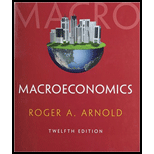
Macroeconomics (Book Only)
12th Edition
ISBN: 9781285738314
Author: Roger A. Arnold
Publisher: Cengage Learning
expand_more
expand_more
format_list_bulleted
Question
Chapter 14, Problem 13QP
(a)
To determine
The liquidity effect.
(b)
To determine
The
(c)
To determine
The expectations effect.
Expert Solution & Answer
Want to see the full answer?
Check out a sample textbook solution
Students have asked these similar questions
Not use ai please
Not use ai please
Not use ai please
Chapter 14 Solutions
Macroeconomics (Book Only)
Ch. 14.1 - Prob. 1STCh. 14.1 - Prob. 2STCh. 14.1 - Prob. 3STCh. 14.2 - Prob. 1STCh. 14.2 - Prob. 2STCh. 14.3 - Prob. 1STCh. 14.3 - Prob. 2STCh. 14.3 - Prob. 3STCh. 14.4 - Prob. 1STCh. 14.4 - Prob. 2ST
Ch. 14.4 - Prob. 3STCh. 14 - Prob. 1VQPCh. 14 - Prob. 2VQPCh. 14 - Prob. 3VQPCh. 14 - Prob. 4VQPCh. 14 - Prob. 5VQPCh. 14 - Prob. 1QPCh. 14 - Prob. 2QPCh. 14 - Prob. 3QPCh. 14 - Prob. 4QPCh. 14 - Prob. 5QPCh. 14 - Prob. 6QPCh. 14 - Prob. 7QPCh. 14 - Prob. 8QPCh. 14 - Prob. 9QPCh. 14 - Prob. 10QPCh. 14 - Prob. 11QPCh. 14 - Prob. 12QPCh. 14 - Prob. 13QPCh. 14 - Prob. 14QPCh. 14 - Prob. 15QPCh. 14 - Prob. 16QPCh. 14 - Prob. 17QPCh. 14 - Prob. 18QPCh. 14 - Prob. 1WNGCh. 14 - Prob. 2WNGCh. 14 - Prob. 3WNGCh. 14 - Prob. 4WNGCh. 14 - Prob. 5WNGCh. 14 - Prob. 6WNG
Knowledge Booster
Similar questions
- not use ai pleasearrow_forwardUse the following table to work Problems 5 to 9. Minnie's Mineral Springs, a single-price monopoly, faces the market demand schedule: Price Quantity demanded (dollars per bottle) 10 8 (bottles per hour) 0 1 6 2 4 3 2 4 0 5 5. a. Calculate Minnie's total revenue schedule. b. Calculate its marginal revenue schedule. 6. a. Draw a graph of the market demand curve and Minnie's marginal revenue curve. b. Why is Minnie's marginal revenue less than the price? 7. a. At what price is Minnie's total revenue maxi- mized? b. Over what range of prices is the demand for water from Minnie's Mineral Springs elastic? 8. Why will Minnie not produce a quantity at which the market demand for water is inelastic?arrow_forwardDon't give AI generated solution otherwise I will give you downward Give correct answer with explanationarrow_forward
- The Firm's Output Decision (Study Plan 12.2) Use the following table to work Problems 4 to 6. Pat's Pizza Kitchen is a price taker. Its costs are Output (pizzas per hour) Total cost (dollars per hour) 0 10 1 21 2 30 3 41 4 54 5 69 4. Calculate Pat's profit-maximizing output and economic profit if the market price is (i) $14 a pizza. (ii) $12 a pizza. (iii) $10 a pizza. 5. What is Pat's shutdown point and what is Pat's economic profit if it shuts down temporarily? 6. Derive Pat's supply curve.arrow_forwardUse the following table to work Problems 27 and 28. ProPainters hires students at $250 a week to paint houses. It leases equipment at $500 a week. The table sets out its total product schedule. Labor (students) 1 Output (houses painted per week) 2 23 5 3 9 4 12 5 14 6 15 27. If ProPainters paints 12 houses a week, calculate its total cost, average total cost, and marginal cost. At what output is average total cost a minimum? 28. Explain why the gap between ProPainters' total cost and total variable cost is the same no matter how many houses are painted.arrow_forwardUse the following table to work Problems 17 to 20. The table shows the production function of Jackie's Canoe Rides. Labor Output (rides per day) (workers per day) Plant 1 Plant 2 Plant 3 Plant 4 10 20 40 55 65 20 40 60 75 85 30 65 75 90 100 40 75 85 100 110 Canoes 10 20 30 40 Jackie's pays $100 a day for each canoe it rents and $50 a day for each canoe operator it hires. 19. a. On Jackie's LRAC curve, what is the average cost of producing 40, 75, and 85 rides a week? b. What is Jackie's minimum efficient scale?arrow_forward
arrow_back_ios
SEE MORE QUESTIONS
arrow_forward_ios
Recommended textbooks for you
 Economics (MindTap Course List)EconomicsISBN:9781337617383Author:Roger A. ArnoldPublisher:Cengage Learning
Economics (MindTap Course List)EconomicsISBN:9781337617383Author:Roger A. ArnoldPublisher:Cengage Learning
 Economics Today and Tomorrow, Student EditionEconomicsISBN:9780078747663Author:McGraw-HillPublisher:Glencoe/McGraw-Hill School Pub Co
Economics Today and Tomorrow, Student EditionEconomicsISBN:9780078747663Author:McGraw-HillPublisher:Glencoe/McGraw-Hill School Pub Co Essentials of Economics (MindTap Course List)EconomicsISBN:9781337091992Author:N. Gregory MankiwPublisher:Cengage Learning
Essentials of Economics (MindTap Course List)EconomicsISBN:9781337091992Author:N. Gregory MankiwPublisher:Cengage Learning Brief Principles of Macroeconomics (MindTap Cours...EconomicsISBN:9781337091985Author:N. Gregory MankiwPublisher:Cengage Learning
Brief Principles of Macroeconomics (MindTap Cours...EconomicsISBN:9781337091985Author:N. Gregory MankiwPublisher:Cengage Learning Principles of Economics (MindTap Course List)EconomicsISBN:9781305585126Author:N. Gregory MankiwPublisher:Cengage Learning
Principles of Economics (MindTap Course List)EconomicsISBN:9781305585126Author:N. Gregory MankiwPublisher:Cengage Learning

Economics (MindTap Course List)
Economics
ISBN:9781337617383
Author:Roger A. Arnold
Publisher:Cengage Learning


Economics Today and Tomorrow, Student Edition
Economics
ISBN:9780078747663
Author:McGraw-Hill
Publisher:Glencoe/McGraw-Hill School Pub Co

Essentials of Economics (MindTap Course List)
Economics
ISBN:9781337091992
Author:N. Gregory Mankiw
Publisher:Cengage Learning

Brief Principles of Macroeconomics (MindTap Cours...
Economics
ISBN:9781337091985
Author:N. Gregory Mankiw
Publisher:Cengage Learning

Principles of Economics (MindTap Course List)
Economics
ISBN:9781305585126
Author:N. Gregory Mankiw
Publisher:Cengage Learning